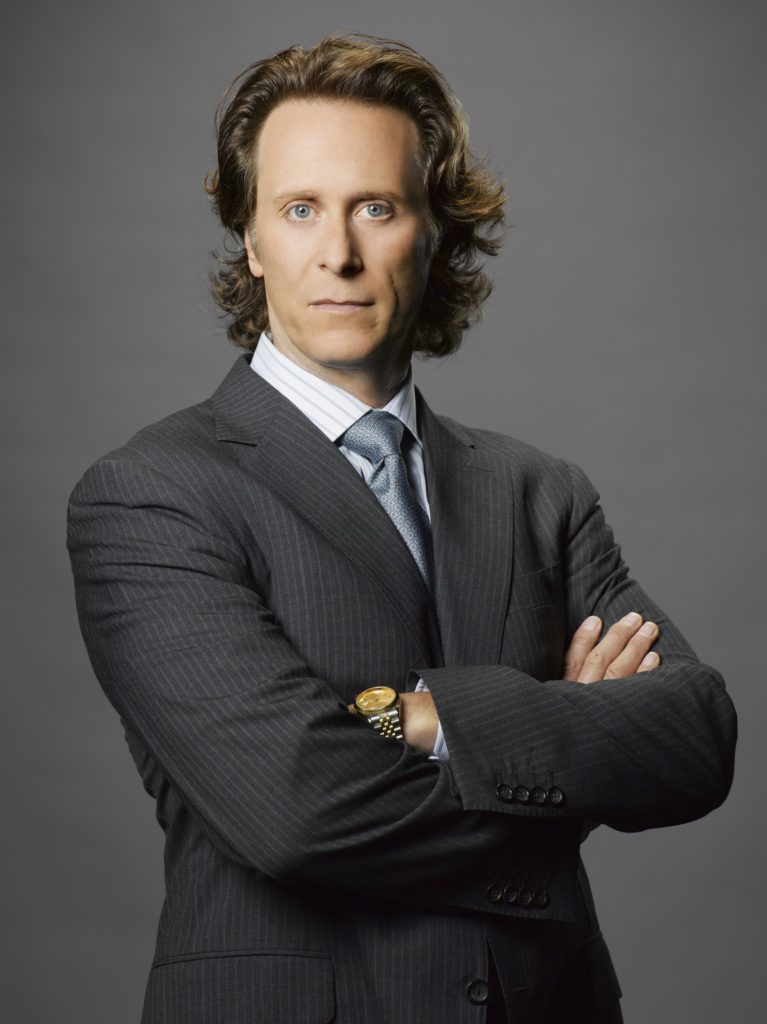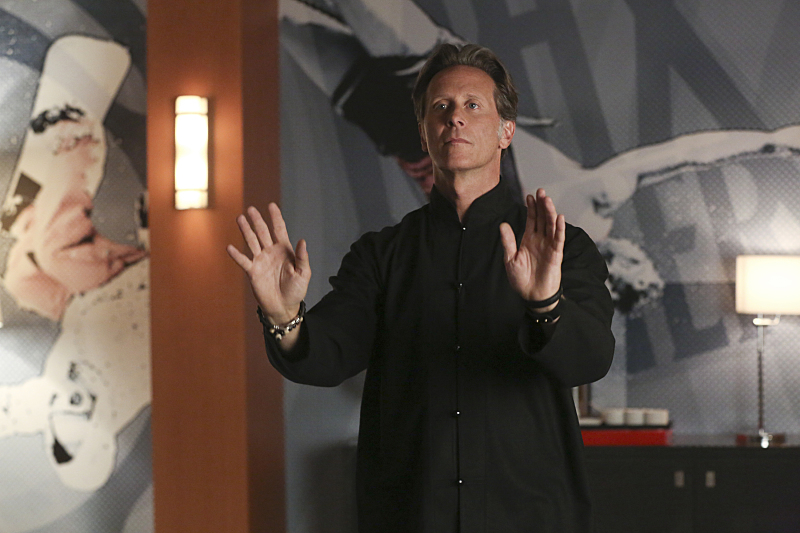
If you’re a fan of pop culture in any capacity, you’re familiar with Steven Weber’s work. He spent most of the 1990s portraying Brian Hackett on “Wings” before transitioning into an eclectic career that has included portraying equally-eclectic characters in projects such as “Studio 60 on the Sunset Strip,” “Helix,” “iZombie,” and for those comic book-loving fans, the voice of Norman Osborne in “Ultimate Spider-Man.”
We recently sat down with Weber for a refreshing and informative conversation about the inner workings of the film and television industry where we discussed ageism, embracing experience and how actors should diversify their creative capacity.
TrunkSpace: From an acting perspective, what’s more difficult… finding that first big break or maintaining career longevity?
Weber: I would say maintaining because now that I’m, you know, middle aged… that is if I last to be 106… because of the limitations of the business having to do with ageism, for one thing, and, cable TV not withstanding, the kind of limited roles there are for guys like me and just maintaining enthusiasm after 30 plus years. It is hard. It’s like you know too much. I know far too much about the business and about my life and all that stuff and that really your impulse is to just say, “Fuck it,” move to a farm some place and drink red wine and that’s the end. So it is harder now than it was in the beginning. In the beginning you’re full of optimism and carelessness and so it’s kind of easy to just fall into things if you have certain rudimentary abilities and tools and things like that.
TrunkSpace: Well, and with the amount of turnover in the business on the development side with executives and producers… it seems like they’re staying young and not aging alongside of everybody else.
Weber: The problem with that is, and I’m not just saying it because I like to think of myself that way… one is not taking advantage of the accumulative experience and wisdom, creative and otherwise, of the people who have been around longer. You see more of that in Europe. You see it in England certainly. You can even see it in the Harry Potter movies, for example, where the elite were very young, but they were supported by a plethora of older actors of every shape and stripe and gender. One reason why the movies were so successful is because of the accumulated talent and wisdom over the years… decades of experience. And I think that’s really important. I think it’s also what’s wrong with, kind of the corporate-driven industry that is so-called network television. I think cable TV gets it because they know that they have to trust the creative process in order to be profitable. And the model that you described, which is that kind of quick turnover, only knows the bottom line and the immediate gratification of a high rating or a big box office weekend and it doesn’t take into consideration that they could do so much more with the people that know more.
TrunkSpace: And one can say that there is more content now than ever before, which is true, but at the same time, most of it is based on a pre-existing brand or world, so while creatively it’s more interesting… it’s starting to all look the same.
Weber: Ah. Yeah. Interesting. Well, I don’t know if there’s a way around that. Maybe it’s just about reinventing. One can argue that that’s what civilization is. Every generation isn’t starkly different, it’s just a variation on the previous one and so on and so forth. It’s about honing and mining further… further detail… and yet, there are things that are eternal. There are basic concepts, whether it’s, I don’t know, dynamic of a family or sibling rivalry or whatever thing you wanted to put into a story, which has been seen a million times, but is still compelling.
TrunkSpace: You mentioned that roles are not as readily available once you reach a certain age (or perceived age) within the industry, but are the roles that are available more interesting? Are you playing characters that have more layers because as the characters themselves are older, they’ve lived more life?
Weber: I think that’s mostly by virtue of the person playing the role rather than a writer writing those layers. Obviously it depends on the project. If there’s somebody who has awareness of the complexity of people of a certain age or certainly any different experience than the kind of common one that’s dramatized… the hero, the villain, etc., then I think it depends and rests mostly on the fact that the person playing the role is, by definition, multi-layered. They have more layers of dead skin on them. Flaking off onto their wardrobe.
TrunkSpace: (Laughter) So looking back at something like “Wings” where you spent a 172 episodes playing Brian, if another opportunity presented itself where you knew you’d be playing a character for that amount of time, would you welcome that type of commitment at this point in your career?
Weber: I would welcome it if it was 572 episodes because the practical part of me says that I’m basically a middle class guy… I was raised in a lower middle class household… and my sensibility says, make a living. If I’m lucky enough to do something that’s also creatively satisfying, that’s great, but really my main purpose is to keep my kids in school and roofs over their heads and my head and my loved ones heads and all that stuff. So, yeah, I would absolutely welcome that. That’s the business part. That’s the business part of it that you have to be… well, you don’ have to be, but in my case, I look forward to satisfying that part of my life.
TrunkSpace: When you were starting out and dreaming of your future career, what did that kind of young and ambitious dream look like? What did you hope your career was going to be and have you achieved those goals for yourself?
Weber: Well, in a way I didn’t have lofty dreams. I, in a way, aimed to the middle. And by that I mean, I never dreamt of being a huge star. In fact, my acting models were almost invariably character actors in movies that I had seen, rather than leading men types. I feel like in a way I’ve achieved that, although I have played a bunch of leads. I kind of ambled into acting rather than pursued it with a laser-like focus. I just found myself in it and found myself just kind of moving with the current. It wasn’t until much later that I realized that I had to apply effort to keep propelling myself along this path. So, I have achieved more than I had dreamt and apropos to your first question, the task at hand is kind of to maintain that position now.
TrunkSpace: Is it easier to maintain that now, again, going back to the idea that there are more parts available to actors due to the number of different channels and platforms where scripted  content is being created?
content is being created?
Weber: You would think, but I don’t think it’s reflective of the volume of projects necessarily. I still think a lot of those projects have certain criteria, which make it challenging for actors of certain ages and certainly of certain genders and races. That said, and having said whatever I said about ageism, for instance, I’ve been around long enough and have been fortunate enough to work a lot, so I have a degree of notoriety in the industry and that has still allowed me to work, either by virtue of my own talent and ability or by people recognizing me and recognizing that I can do a particular job in a particular way and so I get that job. I can’t say it’s easier and obviously it still requires effort. I think it’s a positive thing that there is so much material out there, but inherent in being a professional actor is the challenge of having to usually just reintroduce yourself over and over and over and over to people, who like you say, turnover fast. And so, there are plenty of people who don’t know what “Wings” was or “Studio 60” or anything, so, that makes it not easy, for instance. But, I think in this case, the volume absolutely helps the situation.
TrunkSpace: The industry has changed so much over the course of the last decade, particularly in TV. As an actor, what is the biggest change you have witnessed in terms of how it has directly effected actors.
Weber: For me the biggest change has been reflected in what an actor needs to do in order to remain competitive in the business. Which is to say, you don’t have to change your style of acting or learn a new method or anything like that. That’s been perennial. But what has changed for a person who wants to pursue acting is that, they can’t JUST pursue acting. They must also try to learn how to write. How to produce. How to direct. How to exist on multi-platforms because, except in rare cases, only acting will not allow you to make a living. You’ve got to expand your skill set and that’s really been a change and I think that’s come about precisely because the business model of the business has changed. Yes, they’re not paying as much and when people, and this has happened to me, say they’re going to buy a project… “We like your idea and we’ll buy it,” it doesn’t mean they’re going to buy it with money. (Laughter) Oddly enough. They expect you to then write it. They often expect you to film a portion of it, if not all of it. I’ve been in that situation many times, whereas years ago I had a few deals at studios where they said, “Hey, we like you… come up with some ideas. In exchange we’ll give you an office and a little salary and you can produce.” And that was the kind of cool thing about being an actor about 20 years ago was that, if you had any degree of success, people would court you and to court you they would throw money at you. I liken this to what happened in the airline industry. A long time ago… maybe not that long ago… it was assumed on the part of the airlines that they needed to lower their prices in order to attract customers until they realized that people are desperate to travel. At some point they said, “The hell with this… we’re not lowering our prices. We’re raising them!” And people still fly and it still makes a lot of money and they keep raising the prices. And that mentality, in a way, has permeated the entertainment industry. It has become a very, very kind of financially-centric enterprise. I feel like even more than it was. They seek to cut corners. And they realize that they have way more people who will work for pennies than even the redoubtable stars and experts that they used to throw all sorts of money at, which is why a lot of big screen actors are now working for TV. It’s not like they’re making pennies, but they’re certainly not making the, I don’t know, seven figure salaries that they might have been used to making. This is the same in writing and directing as well.
TrunkSpace: Yes. There was a day when options with significant option fees were being thrown around like crazy and people could live off of those. Now, you’re expected to give free options on projects and for a longer period of time.
Weber: Correct. It’s ridiculous. But, you know what, some say that it’s actually a good thing because you have to rely on your mettle. So getting back to the question… actors now have to think out of the box and I think it’s important. I think it’s good. I mean, the downside of all sort of technology is that… well, I’ll say the upside of modern technology and the availability of equipment and computers and stuff is that anybody can make a film. Anybody. And the downside of all of that is that anybody can make a film. Anybody. So there’s no specialization and that’s kind of the whole point of being an actor in a pure sense is that you got into it for the art rather than the business. If people are going into the business to try to be famous or rich, that’s going to be tough. If you want to go into this craft to find artistic and creative satisfaction, well that’s something entirely different.
TrunkSpace: You’ve done some directing in the past. Is that something you want to return to as you talk about diversifying your skill set?
Weber: Well, I only directed a couple of things and that was years ago. And in fact, in a time that we’re referring to when I could say to the head of Showtime… before Showtime became the hit kind of indy place that it is now… “I’d like to direct something.” They were like, “Oh, great!” It was a fringe thing and so I was able to do things like that. But really right now my focus is on developing and writing, which I have been doing a lot of. I’m currently developing something with Bryan Cranston attached as a co-creator. I’m writing things. I’m doing what I just described my advice for other actors is, which is to expand your skill set. So that’s kind of what I’ve been doing.
TrunkSpace: It always seems like actors with a strong writing sense can really add a different perspective when it comes to character voices because they’re so used to playing different characters that they can instantly recognize the separation in the writing itself.
Weber: Well, you might be right. On the other hand, I think that it would presumptuous of me or any other actor to just assume that writing is easy. In fact, it’s incredibly difficult. Arguably more difficult than acting. It is an often solitary exercise. The written word is the basis for, really, the entire industry in a sense. I have only done it out of a desire to survive and it’s not my chosen discipline. Not every actor, regardless of how good they are, might be able to write. Conversely, I don’t know if writers are necessarily good actors. (Laughter) They could be.
I think more and more, just on a practical level, it helps if everybody has an expanded understanding of the other components in creating a movie, television show, musical, or whatever it is, because at the end of the day, it’s a communal exercise. It’s a community. To me, that’s the most important aspect of being an actor and it becomes very stark to me having been out in LA for 30 years that the thing that I’m missing, having come from New York, is that sense of community. That sense of being able to create regardless of your circumstance.

TrunkSpace: And what’s so interesting about that is, we now live in a world where everyone can be so connected all the time, and yet, we’re losing our sense of community.
Weber: Well, I agree. This is why I think a lot of social media is anti-social media. It’s a fiction that we’re connected. You’re only connecting one aspect of your being, which is that kind of limbic brain, immediately gratifying, “I’m going to type out a snarky response” thing. As opposed to having to SHOW UP. Last night I went to… sounds like I’m a snob… but last night I went to see a production of “Long Day’s Journey Into Night” here in LA with Alfred Molina and Jane Kaczmarek and, you know, it’s a “small” production… it’s not a Broadway production… but it’s so GODDAMN important to show up. To be a part of the community. You get so much more out of it at such a more involving and, I don’t know if this is even a real word, impactful experience.
TrunkSpace: Can you tell us a little bit about what you have upcoming that fans can look out for?
Weber: I actually have a couple of things. I have a recurring role in this thing called “13 Reasons Why,” which is a Netflix series based on a very popular novel about teen suicide. And then the flip side of that is, I play a very funny heavy in a show that will hopefully be a Netflix series that Jeff Garlin wrote and is starring in.
TrunkSpace: And that project, “Handsome,” seems like it has a great cast.
Weber: Oh, it’s unbelievable. It’s kind of a homage to the old NBC mystery movie wheel, which was every week there was “Columbo” and then “McCloud” and then “McMillan & Wife.” It was actually conceptually really good. It was like having three shows in one and every week they would show a different one and people were hooked into it. This is the Jeff Garlin version, which means it’s hilarious, filthy, and… filthy.
“13 Reasons Why” premieres March 31st on Netflix.
“Handsome” premieres May 5th on Netflix.






